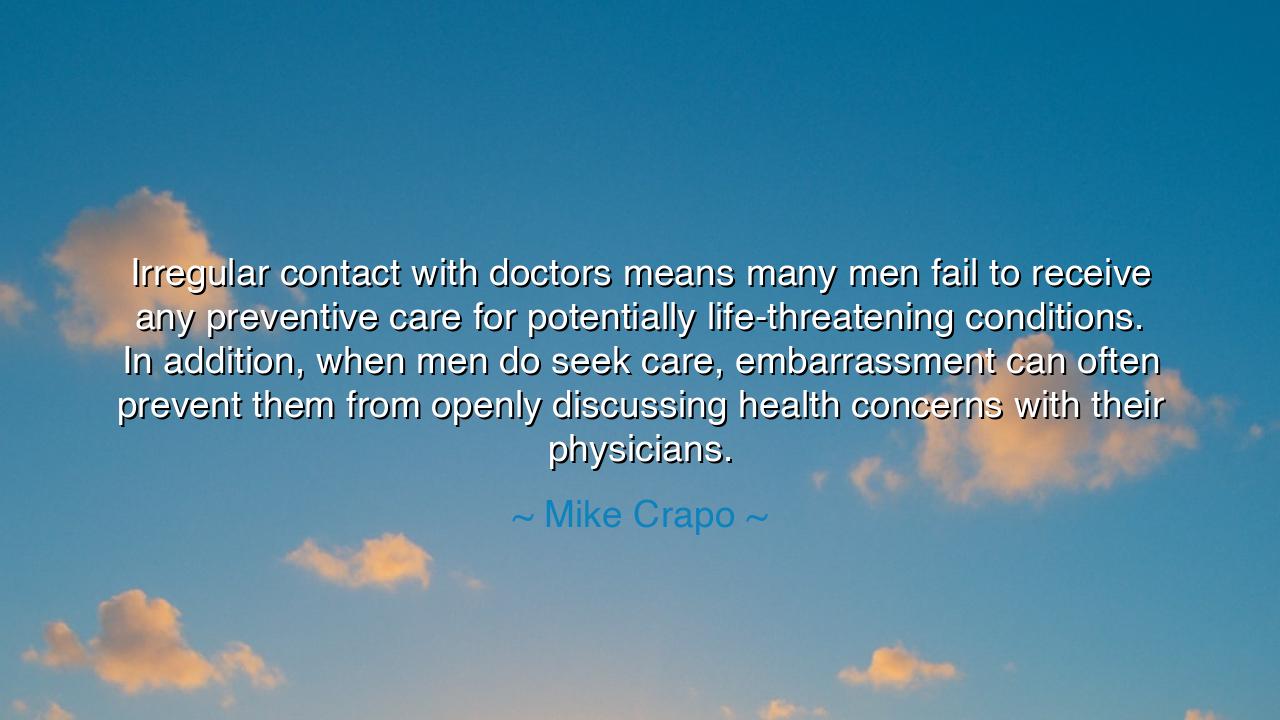
Irregular contact with doctors means many men fail to receive any
Irregular contact with doctors means many men fail to receive any preventive care for potentially life-threatening conditions. In addition, when men do seek care, embarrassment can often prevent them from openly discussing health concerns with their physicians.






In the solemn and compassionate words of Mike Crapo, we find a truth both intimate and universal: “Irregular contact with doctors means many men fail to receive any preventive care for potentially life-threatening conditions. In addition, when men do seek care, embarrassment can often prevent them from openly discussing health concerns with their physicians.” These words are not merely an observation about medicine — they are a reflection on the deep and ancient struggle between pride and vulnerability, between the armor of strength and the quiet necessity of healing.
Since the earliest days of humankind, men have been taught to endure. The hunter who fell in the forest bound his wounds in silence; the warrior who bled in battle bit his lip and stood tall. To show pain was to invite weakness; to seek help was to risk shame. Yet what began as a virtue of endurance has, in modern times, become a silent curse. For as Crapo wisely declares, this irregular contact with doctors — this avoidance of care — leads countless men to suffer in secret from life-threatening conditions that might have been healed had they faced them without fear.
In the ancient world, the Greeks revered Asclepius, the god of healing, and built temples where men and women alike would come to rest, dream, and confess their ailments. To hide one’s sickness from the healer was considered folly, for the disease left unspoken would fester and grow. Yet in our own age, many men walk as their own physicians, treating pain with denial and covering fear with bravado. They speak to their brothers of strength but rarely of frailty; they labor for others but neglect themselves. This embarrassment, as Crapo names it, is not merely shyness — it is the shadow of a culture that equates vulnerability with weakness.
Consider the story of Ernest Hemingway, the man of war, the hunter, the writer whose very name became a symbol of masculine strength. Beneath that rugged exterior, he carried wounds of the mind that no amount of courage could conceal. Yet he could not bear to face them, could not bring himself to seek the help that might have saved him. His tragedy is not only his own, but the reflection of a greater tragedy — that countless men, chained by pride and silence, turn away from the very care that could preserve their lives.
Crapo’s words reveal a paradox at the heart of manhood: the same strength that enables men to endure hardship also drives them to ignore their own needs. The soldier marches through pain; the worker hides his exhaustion; the father bears his burdens quietly for the sake of his family. Yet without preventive care, the body becomes the battleground and the mind, the prisoner. True courage, then, is not found in enduring pain but in facing it — in speaking honestly to one’s physician, to one’s loved ones, to oneself. For honesty in illness is not weakness; it is wisdom.
We see glimmers of hope in those who have broken the silence. The campaigns for men’s health awareness, the movements for open dialogue about mental health, and the rise of those who share their stories publicly — these are the warriors of a new kind. They remind us that the greatest battles are fought not with sword and shield, but with candor and humility. To say “I need help” is an act of profound bravery, for it defies centuries of conditioning that says a man must stand alone.
And so, the lesson of Crapo’s words is this: the body cannot be strong if the spirit is ashamed to seek healing. Let every man cast aside the false armor of pride, and in its place wear the true strength of honesty. Speak to your doctor not as an adversary, but as an ally. Take the time for your health, not as a burden, but as a duty — to yourself, to those who love you, to the life that depends on your care. For in tending to the self, one does not betray his strength; he honors it.
Let future generations remember this truth: that no man is made lesser by his wounds, but only by his refusal to face them. The wise warrior knows when to fight — and when to heal. As Mike Crapo reminds us, embarrassment has no place in the temple of life. Health is not a privilege, but a responsibility. And in embracing it with courage and humility, we rediscover the ancient balance — the harmony between strength and tenderness, endurance and care — that has always defined the best of what it means to be human.






AAdministratorAdministrator
Welcome, honored guests. Please leave a comment, we will respond soon